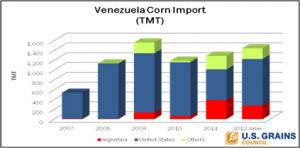After a 14 year rule as president of Venezuela, the passing of Hugo Chavez leaves the country’s agricultural sector in a state of uncertainty.
U.S. Grains Council Regional Director Kurt Shultz said misguided agricultural policies have “destroyed agricultural outputs” in Venezuela.
“The country’s policy of expropriating or nationalizing domestic industry has also hurt private investment and reduced the productive capacity of the private sector,” said Shultz.
USGC staff was in Venezuela this week presenting results from the USGC Corn Harvest Quality Report 2012/13. Due to the low agricultural output, Venezuela has become the second-largest corn market after Mexico in the Latin America region, importing more than 1 million metric tons (39 million bushels) of U.S. corn annually.
Shultz said that Chavez’s successor could be up against a period of political infighting – creating additional uncertainty and risk for the livestock industry, which is already faced with price controls, corruption, and foreign exchange limits.
Venezuela’s economic picture is also complicated by the substantial subsidies the Chavez government has been paying to Cuba and Nicaragua. Under Chavez’s, rule, Venezuela replaced the Soviet Union as Cuba’s benefactor, with annual subsidies estimated at $3-4 billion, largely in discounted oil. Annual payments to Nicaragua amount to around $500 million. These are heavy burdens for a country which, despite having one of the world’s largest oil reserves, has one of the world’s largest fiscal deficits, high inflation rates, widespread commodity shortages, and an active black-market currency where the bolivar is traded at one-fourth the official rate. Venezuela’s economy will need time to recover, and whoever replaces Chavez will enter a tough current state.


